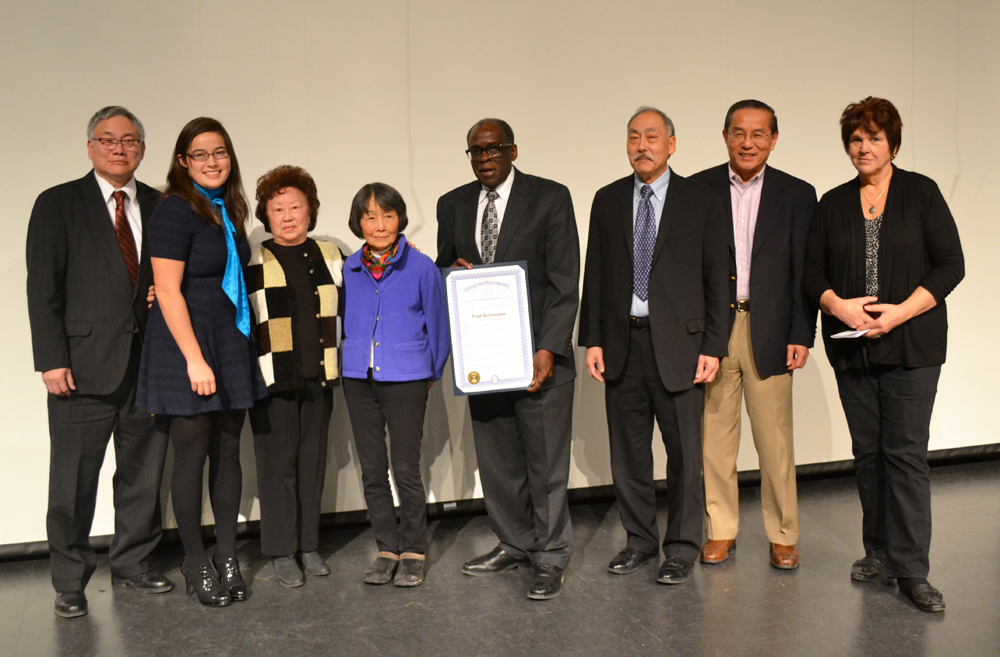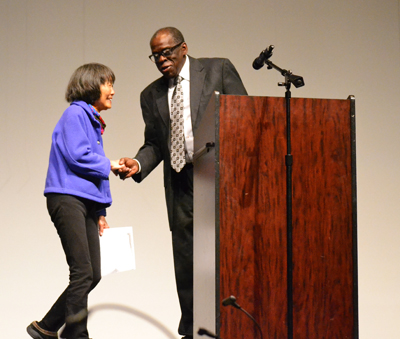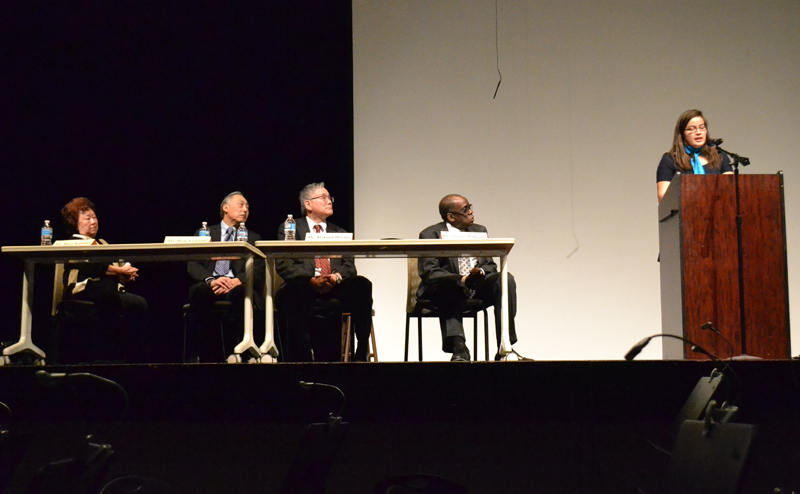
Feb. 4, 2014
By Tara Cavanaugh
If you don’t know Fred Korematsu’s name now, you will soon be unable to forget it.
Korematsu is a civil liberties icon who defied the U.S. government’s order for Japanese Americans to report to an assembly center after the bombing of Pearl Harbor in 1944. The story of his life –– which includes arrest, conviction, and a Supreme Court case as he doggedly fought for his rights as an American citizen –– was celebrated at a recognition ceremony at Huron High School on Jan. 30.
Representatives from the Michigan Department of Civil Rights, the Michigan Asian Pacific American Affairs Commission and the Ann Arbor City Council attended the ceremony, as well as tenth grade history students.
Korematsu is known today as a civil liberties hero. He was given the Presidential Medal of Freedom by President Bill Clinton in 1998, and his story can be found in history books as an example of minority discrimination and persecution, especially in times of war.
When Japanese Americans were ordered to report to an assembly center after the bombing of Pearl Harbor, then 23-year-old Korematsu refused. He was arrested and convicted for his refusal to report and was eventually sent to live in Topaz, an internment camp in Utah, with 8,000 other internees. Over 110,000 Japanese Americans were sent to internment camps during WWII.
Korematsu appealed his case to the U.S. Supreme Court, which ruled against him in a 6-3 decision in 1944.
A panel of speakers lauded Korematsu, including: Director of Michigan Department of Civil Rights Matt Wesaw, who read the tribute on behalf of Gov. Rick Snyder; Dr. Jamie Hsu, Chair of the MAPAAC; Ron Aramaki and Ronald Hwang, who teach Asian American history at U-M; and Mary Kamidoi, treasurer of the Japanese American Citizens League of Detroit and a survivor of an internment camp.

Mae Watanabi, 91, also spoke. She was in her second year in college when President Franklin D. Roosevelt issued the executive order to the U.S. military to round up all Americans of Japanese descent.
“To be honest, I think most of us were stunned,” Watanabi said to the audience. “We reacted like sheep being herded along with the orders, which we couldn’t understand.
“Fred Korematsu was wide awake, realizing that he is a man who is worth something, who has a right to speak out and fight for his rights. Most of us did not do that.”
A small woman, Watanabi was barely visible above the dais, but her voice was clear and strong. “It was unbelievable that the constitution did not mean anything,” she said. “We were born here and were supposed to have these rights… and because we looked like the enemy we were treated like that.”
In the documentary film “Of Civil Wrongs and Rights: The Fred Korematsu Story,” Korematsu recalls little support from his community. When he went to the Topaz internment camp, many scorned him and acted as if he had betrayed his heritage.
After leaving the camp, Korematsu spent over 30 years silent about his ordeal. He lived in Salt Lake City, Detroit and returned to Oakland, Cal. in 1949. In the documentary, Korematsu’s daughter Karen recounts first learning about her father’s activism in a high school history class.
Then in 1983, with the help of a lawyer, Korematsu’s conviction was formally vacated in a California U.S. District Court. The judge determined that the War Department misled the Supreme Court with false allegations of espionage and sabotage in 1944.
Huron senior Hao Hao Wang reminded the audience and her peers that even though Korematsu’s story began 70 years ago, discrimination and maltreatment to minority populations in the U.S. are still prevalent. She cited the Treyvon Martin case, the fatal shooting of Renisha McBride in Detroit last fall, and numerous instances after the Sept. 11, 2001 attacks in which Muslims, Arab Americans, Indians and other minorities were reported and investigated for “suspicious behavior.”

“It is important for us, as young people, to look out for each other and to stand up for our friends and neighbors,” Wang said. “We should fight against all forms of ignorance and bigotry.”
Wang closed her remarks with a quote from Korematsu himself: “If you have the feeling something is wrong, don’t be afraid to speak up and stand up for what is right.”



Be the first to comment